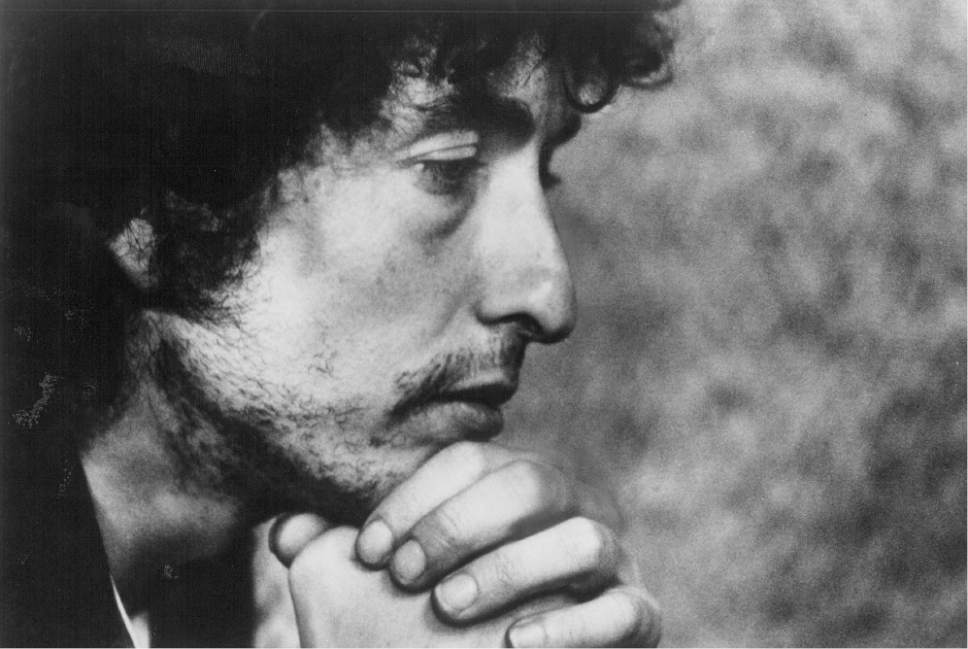This is an archived article that was published on sltrib.com in 2016, and information in the article may be outdated. It is provided only for personal research purposes and may not be reprinted.
Bob Dylan's lyrics seemed to be swirling in the ether Thursday — from "the jingle-jangle morning" to "hard rain's a-gonna fall" — after the legendary troubadour won the Nobel Prize in literature.
His work has stretched across more than half a century and his songs encompass the peace and civil rights movements of the 1960s and '70s and then mushrooms into musical storytelling that reflects the American experience and beyond.
" 'There must be some way out of here,' said the joker to the thief
'There's too much confusion, I can't get no relief
Businessmen, they drink my wine, plowmen dig my earth
None of them along the line know what any of it is worth.' "
— "All Along the Watchtower," 1967
Since bursting onto the New York music scene in 1961, Dylan has captivated many, including Utahans, with lyrics that reflect times present and everlasting, capturing the human condition — the hopes and longings that couldn't escape fate.
"How does it feel?
To be on your own,
With no direction home
A complete unknown,
Like a rolling stone?"
— "Like a Rolling Stone," 1965
Or, in the words of the Swedish Academy: He "created new poetic expressions within the great American song tradition." Katharine Coles, a former Utah poet laureate and an English professor at the University of Utah, was surprised but delighted by the award. "I didn't think this would happen," she said. "I'm glad the committee found its way here — not language alone, but the tradition of song" that harks back to Homer.
Dylan's language is simple and direct on one hand, Coles noted, but deeply illusionary on the other.
"The lyrics have a kind of richness," she said. "They don't tell a story directly but evoke a story."
"Hey, Mr. Tambourine Man, play a song for me
I'm not sleepy and there ain't no place I'm going to
Hey, Mr. Tambourine Man, play a song for me
In the jingle-jangle morning I'll come followin' you."
— "Mr. Tambourine Man," 1965
His first hit, "Blowin' in the Wind," almost immediately entered the canon of folk music, said rock 'n' roll aficionado John Florence, who for many years has spun discs and offered musical commentary on Salt Lake City's KRCL radio.
"It's great he's being recognized like this," Florence said. "And I think it's great he's being recognized in his lifetime."
Today, Florence said, people quote the 75-year-old Dylan like they do Shakespeare.
"Come mothers and fathers
Throughout the land
And don't criticize
What you can't understand
Your sons and your daughters
Are beyond your command
Your old road is rapidly agin'
Please get out of the new one if you can't lend your hand
Cause the times they are a-changin'."
— "The Times They Are A-Changin'," 1963
"He knew he couldn't play guitar like that guy," Florence said, "or sing like that guy." His words set him apart.
Often playing against expectations, Dylan seemed to know exactly what he was doing. The darling of the folk world shocked and angered his fans at the Newport Folk Festival in 1965, when he played "Maggie's Farm" to electric guitar.
On tour that year, backed up by The Band, he was booed at every stop, Florence recalled. But when Dylan and The Band went on tour in 1974, with much of the same material, it was the most successful road trip of that time.
"He's an artist," Florence said, "and doesn't look back."
David Kranes, a renowned Salt Lake City novelist and playwright, said Dylan's lyrics have had a healing effect on cultures and countries.
"The influence of his words on people across the globe is immeasurable," he said. "He is a person of words without borders."
Dylan's Nobel is "wonderful," Kranes said, "opening the lens on what literature can mean."
Many musicians and would-be songwriters looked to Dylan as a pioneer in songwriting. That continues to this day, said Nick Newberry, 35, who plays accordion in the Salt Lake City band Hectic Hobo.
"Bob Dylan has a special place in my heart. He inspired me to become a musician in the first place," he said. "I was 15 years old — feeling his music was a way to make difference. I picked up a guitar and harmonica, because I wanted to play Bob Dylan songs."
Too young to have lived through the 1960s, when Dylan was at the forefront of the peace and civil rights movements, Newberry said those songs, nonetheless, resonate with new audiences.
"It speaks to the timelessness of his work," Newberry said. "It speaks to new generations."
And the Nobel helps guarantee that the Bard of the Ballads will speak to generations to come.
csmart@sltrib.com



